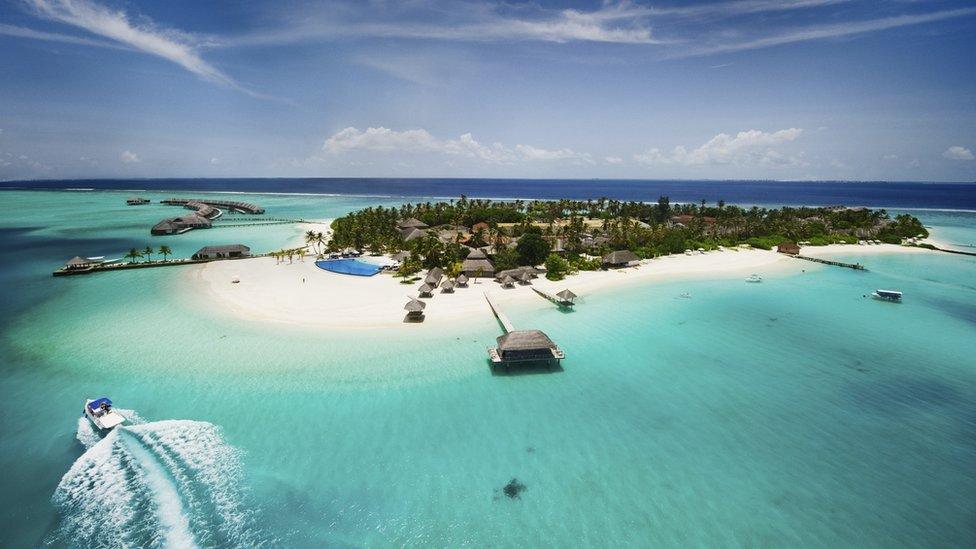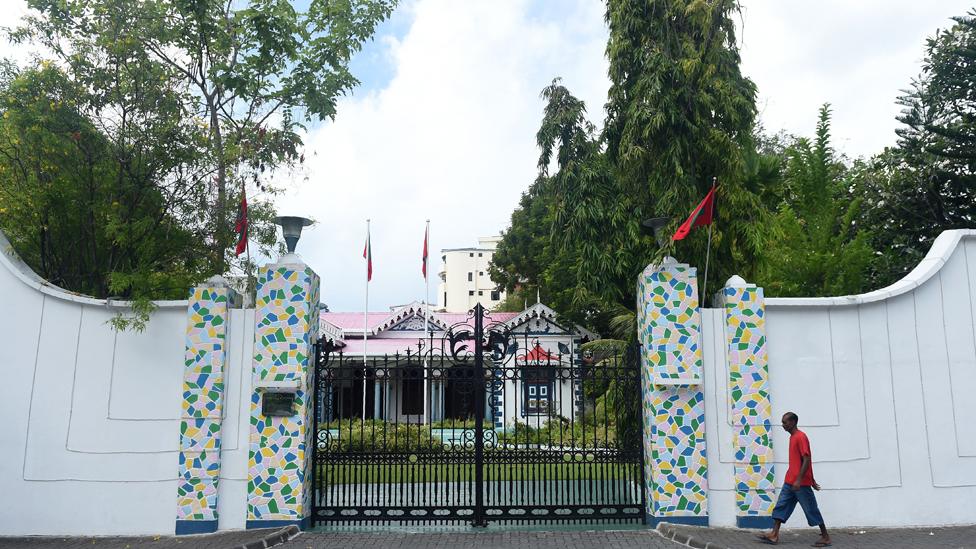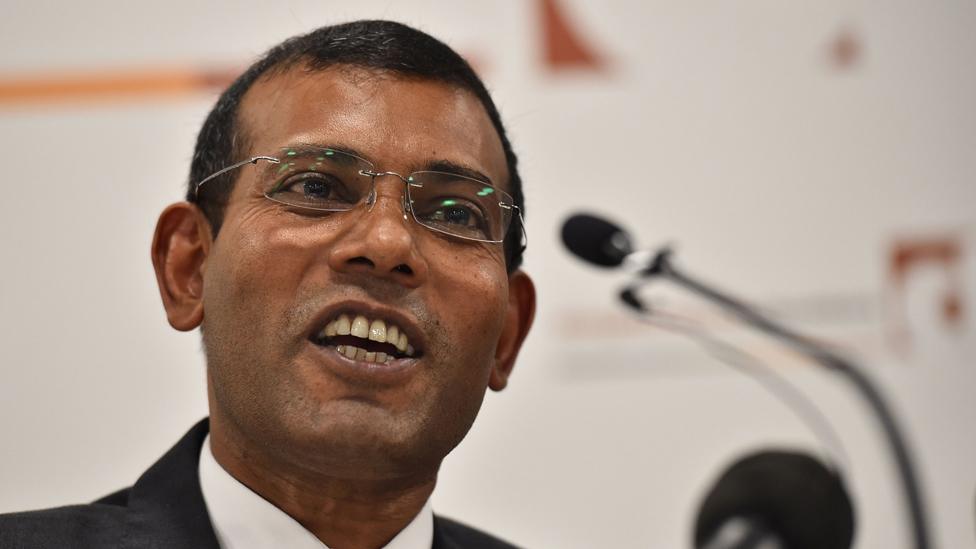Trouble in Paradise
- Published

You don't normally get advance warning of an attempt to topple a government. Efforts to oust leaders are risky undertakings and plotters usually keep their underhand schemes very secret. So I was very surprised when a colleague said she'd got the inside track on just such a plot in the Maldives.
Graham Greene would have immediately recognised the Maldives as the perfect setting for an exotic tale of tropical intrigue.
It consists of 26 coral atolls - 1,192 individual islands - stretching hundreds of miles into the blue vastness of the Indian Ocean like - and let me apologise in advance for this, because it is impossible not to sound like a holiday brochure - like "a string of pearls".
It is justifiably famous for its breathtakingly beautiful, and breathtakingly expensive, luxury hotels. And while we are on the holiday theme, yes, it is a wonderful place for a romantic getaway.
But not a great place to be a journalist. A number of foreign reporters have been deported recently and for covering much less sensitive subjects than well-sourced claims of an impending attempt to depose the government.

That's why we arrived on tourist visas. And I know what you are thinking: that did not mean carte blanche to book ourselves into a super-lux holiday hideaway.
All important decisions in the Maldives are made in the islands' claustrophobic capital, Male. This is on a distinctly unlovely island a couple of miles square and covered in concrete, not white sand beaches.
Male contains all the country's key institutions, and a good chunk of its 400,000-strong population. It is also where my colleague Olivia Lang honed her impressive journalistic skills, working for the Maldives Independent, one of the few sources of objective news on the islands.
She was here in 2008 when more than thirty years of corrupt autocracy finally gave way to democracy. A young progressive, Mohammed Nasheed, swept to power in the country's first free elections, while the former strongman, Maumoon Abdul Gayoom, slunk away to scheme in the shadows.
Olivia reported as President Nasheed rolled back repressive laws, bolstered democratic institutions and captured the world's imagination with an underwater cabinet meeting to highlight the risks of rising sea levels.
The Maldives' brief moment as a model Islamic democracy was not to last, however. The water on the coral reefs may be crystal clear, but politics in the so-called "island paradise" has always been very murky.

Former president Mohammed Nasheed was ousted in a coup and now lives in London
Within four years, Nasheed had been ousted in what he calls a coup. He now lives in self-imposed exile in the UK, while the Maldives is in the hands of the former strongman's half brother, a man called Abdullah Yameen.
Under President Yameen, the Maldives is becoming increasingly authoritarian, claim his opponents. In just the last few weeks - and in spite of harsh criticism from the UN, the EU and the US - his government has brought in legislation restricting freedom of speech and protest, and has also moved to reintroduce the death penalty. Not the actions of a confident leader.
We had to be careful. "Beware anyone loitering suspiciously," Olivia warned.
We had been told Male is full of spies and government informers but loitering appears to be the Maldivian national pastime. The congested streets are full of men in mirror shades lounging idly and smoking cigarettes.
We scuttled between surreptitious appointments in cafes and apartment buildings, and, crouching on the second floor of a derelict building, watched as police scuffled with an opposition rally.

Former president Mohammed Nasheed was ousted in a coup and now lives in London
What became increasingly clear was that president Yameen is indeed vulnerable. His half-brother, former president Gayoom, has recently withdrawn his support - I told you Maldivian politics is murky - and Yameen is now struggling to rally even his own MPs.
But however well-sourced your story is, reporting something as destabilising as an imminent attempt to unseat a president is a big deal, and our editors in London were keen to get more evidence that a conspiracy was under way.
Now that is a tall order. Secret plots don't often have independent observers who can vouchsafe their intrigues.
I drafted an email to the president's office requesting his response to the claims of corruption and repression we planned to make. I asked whether President Yameen was worried there might be an attempt to oust him from office.

Find out more
From Our Own Correspondent has insight and analysis from BBC journalists, correspondents and writers from around the world
Listen on iPlayer, get the podcast or listen on the BBC World Service or on Radio 4 on Thursdays at 11:00 BST and Saturdays at 11:30 BST

The administration is aware that an attempt to "overthrow the government" is being planned, thundered the reply. This is "in clear breach of international legal norms," it continued, the people should decide who governs the Maldives at the ballot box.
After our reports were broadcast, the government insisted it was "steadfast" and organised a mass gathering for the Maldives National Defence Force - its army -to promote what it called "patriotism and love of nation"; stirring songs were sung.
At the same time, former president Nasheed and his key allies were arriving in the Sri Lankan capital, Colombo, a short flight from the Maldives.
Back at my desk in Delhi, the birds caw in the frangipani tree outside as a message pings into my inbox. The Maldivian authorities have just announced new restrictions on foreign journalists operating in the country, it says.
It looks like I won't be welcome back until there's a change of government.
Follow @BBCNewsMagazine, external on Twitter and on Facebook, external